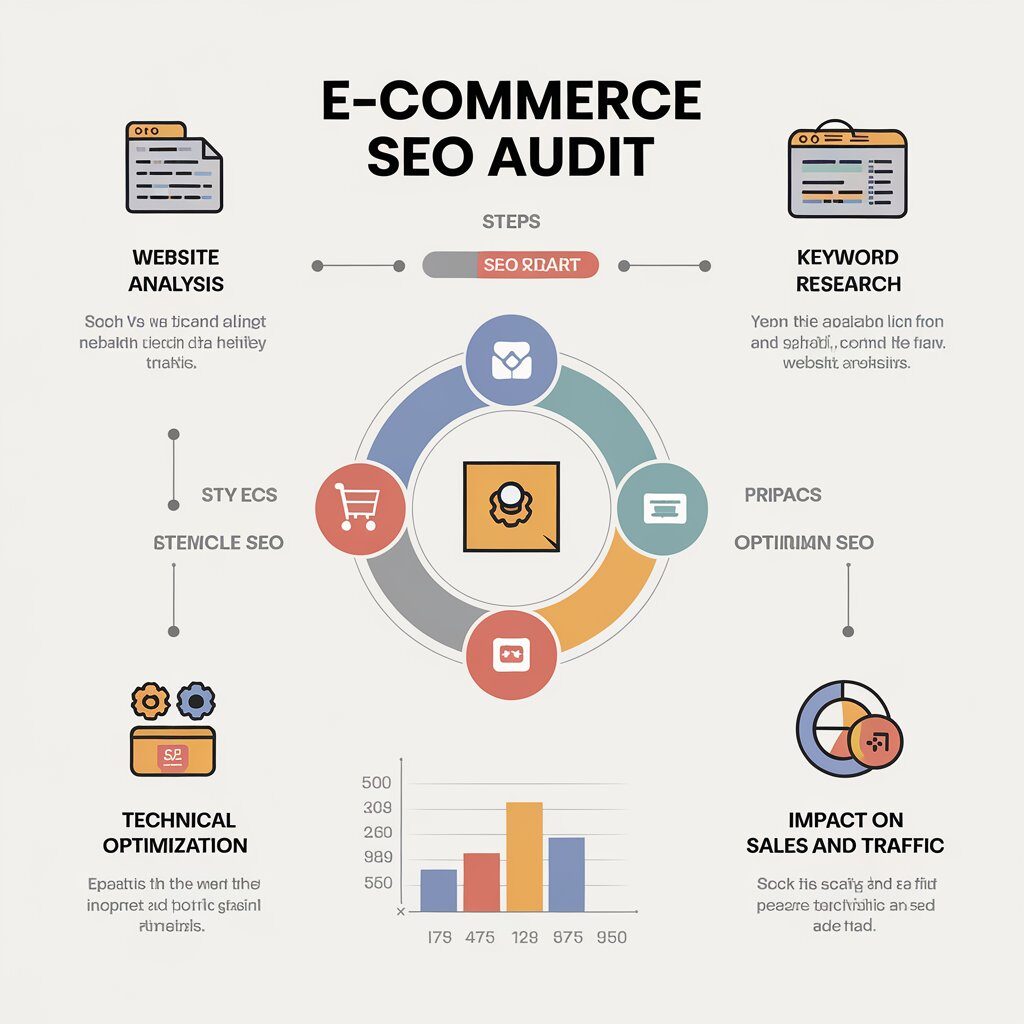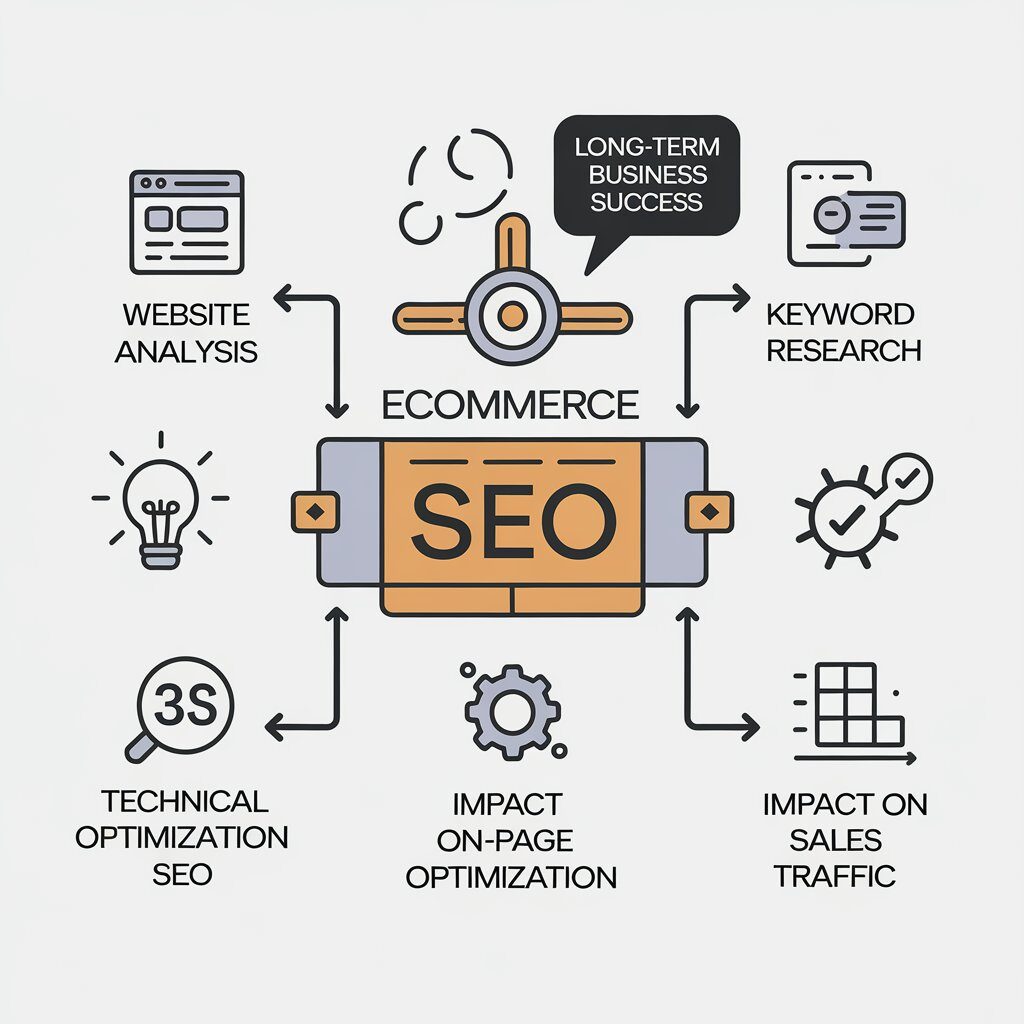What is an eCommerce SEO audit, and why is it necessary?
E-commerce has become a vital part of our lives. It’s a bustling marketplace, teeming with competition. To stand out, eCommerce businesses need to be visible. They need to be found by potential customers. This is where Search Engine Optimization (SEO) comes into play. SEO is the practice of optimizing a website to rank higher in search engine results.
But how do you know if your eCommerce site is optimized? How can you identify areas for improvement? The answer lies in conducting an eCommerce SEO audit. An eCommerce SEO audit is a thorough examination of your website. It assesses how well your site is set up for search engine crawling and indexing. It also evaluates how well it’s optimized for keywords. Also, it checks if it’s user-friendly and if it provides a good user experience.

But why is an eCommerce SEO audit necessary? Firstly, it helps you understand your site’s current SEO performance. It identifies strengths to leverage and weaknesses to address. Secondly, it uncovers opportunities for improvement. These could be technical issues, content gaps, or user experience enhancements.
Thirdly, an eCommerce SEO audit helps you stay ahead of the competition. It provides insights into what your competitors are doing well, and where they’re falling short. Lastly, it aligns your SEO efforts with your business goals. It ensures that your SEO strategy is driving the right kind of traffic to your site.
In essence, an eCommerce SEO audit is a roadmap. It guides your SEO strategy, helping you navigate the complex landscape of search engine algorithms. It’s a tool for growth, a catalyst for improvement. It’s a necessity in the competitive world of eCommerce. In this comprehensive guide, we’ll delve into the intricacies of an eCommerce SEO audit.
We’ll explore its importance, its components, and how to conduct one effectively. Whether you’re an eCommerce business owner, a digital marketer, or an SEO specialist, this guide is for you. It’s a deep dive into the world of eCommerce SEO audits, filled with insights and actionable advice.
So, let’s embark on this journey together. Let’s unravel the mysteries of eCommerce SEO audits, and discover how they can propel your business to new heights.
Understanding eCommerce SEO Audits
Before we delve into the specifics, let’s first understand what an eCommerce SEO audit entails. An eCommerce SEO audit is a comprehensive analysis of your online store. It evaluates how well your website is optimized for search engines. It’s a diagnostic tool. It identifies issues that could be hindering your site’s performance in search engine rankings.
But it’s more than just a problem-finding tool. An eCommerce SEO audit also provides actionable solutions. It offers recommendations on how to fix identified issues. It provides a roadmap for improving your site’s SEO performance.
Definition and Purpose of an eCommerce SEO Audit
An eCommerce SEO audit is a systematic review of your online store. It assesses various elements of your site. These elements include technical SEO factors, on-page and off-page SEO, and user experience. It also evaluates your site’s content and keyword optimization.

The purpose of an eCommerce SEO audit is twofold. Firstly, it aims to identify issues that could be affecting your site’s visibility in search engine results. Secondly, it provides actionable recommendations. These recommendations guide your SEO strategy, helping you improve your site’s performance.
The Difference Between General SEO and eCommerce SEO Audits
While a general SEO audit and an eCommerce SEO audit share similarities, they are not the same. A general SEO audit evaluates a website’s overall SEO performance. It looks at factors like site structure, content, and backlinks. An eCommerce SEO audit, on the other hand, goes a step further. It takes into account the unique aspects of running an online store.
This includes evaluating product pages, category pages, and checkout processes. It also assesses how well your site is optimized for product-related keywords. In essence, an eCommerce SEO audit is more specialized. It’s tailored to the unique needs and challenges of eCommerce websites.
The Importance of eCommerce SEO Audits
The importance of eCommerce SEO audits cannot be overstated. They play a crucial role in the success of your online store.
Improving Online Visibility and Sales
One of the primary benefits of an eCommerce SEO audit is improved online visibility. A well-optimized site ranks higher in search engine results. This leads to increased visibility for your online store.
Increased visibility translates to more traffic to your site. More traffic often results in more sales. In essence, an eCommerce SEO audit can directly impact your bottom line. It can help increase your sales and revenue.
Identifying and Fixing Common SEO Issues
Another key benefit of an eCommerce SEO audit is the identification of common SEO issues. These issues could be affecting your site’s performance in search engine rankings. They could be hindering your site’s visibility and traffic. An eCommerce SEO audit helps identify these issues. It provides a clear picture of what’s working and what’s not on your site.

But identifying issues is just the first step. An eCommerce SEO audit also provides actionable solutions to fix these issues. It guides your SEO strategy. It helps you make informed decisions to improve your site’s SEO performance. In short, an eCommerce SEO audit is a valuable tool. It’s essential for the success of your online store.
Key Components of an eCommerce SEO Audit
An eCommerce SEO audit is a comprehensive process. It involves examining various components of your website. These components can be broadly categorized into four areas. These are technical SEO factors, on-page SEO elements, off-page SEO considerations, and user experience (UX) and conversion rate optimization (CRO). Let’s delve into each of these areas in more detail.
Technical SEO Factors
Technical SEO refers to the technical aspects of your website. These are factors that affect the performance of your site. They include site speed, mobile-friendliness, and the use of HTTPS. Technical SEO also involves checking for broken links and duplicate content.
On-Page SEO Elements
On-page SEO elements are the aspects of your website that you can control. These include your content and the HTML source code of your pages. On-page SEO involves optimizing your title tags, meta descriptions, and headers. It also includes ensuring your content is high-quality and relevant to your target audience.
Off-Page SEO Considerations
Off-page SEO refers to actions taken outside of your own website. These actions can impact your site’s trustworthiness and authority. Off-page SEO involves building high-quality backlinks to your site. It also includes social signals, such as likes and shares on social media.
User Experience (UX) and Conversion Rate Optimization (CRO)
User experience (UX) and conversion rate optimization (CRO) are crucial components of an eCommerce SEO audit. UX refers to the overall experience a user has when navigating your site. CRO, on the other hand, involves optimizing your site to increase the percentage of visitors who complete a desired action.

Both UX and CRO play a significant role in your site’s SEO performance. They can impact your site’s ranking in search engine results. They can also affect your site’s conversion rates and, ultimately, your sales and revenue.
Step-by-Step Guide to Conducting an eCommerce SEO Audit
Conducting an eCommerce SEO audit may seem daunting. However, with a step-by-step guide, the process becomes manageable. This guide will walk you through the process. It will help you understand what to look for and how to fix any issues you find.
Preparing for the Audit: Tools and Resources
Before you start your audit, you need to gather some tools and resources. These tools will help you analyze your site and identify any issues. Some of the most commonly used tools include Google Analytics, Google Search Console, and various SEO software like SEMrush or Ahrefs.
Here is a list of some tools you might find useful:
- Google Analytics
- Google Search Console
- SEMrush
- Ahrefs
- Screaming Frog SEO Spider
- Moz Pro
- Yoast SEO
Technical SEO Checklist
The first part of your audit should focus on technical SEO. This involves checking your site’s performance and functionality. You’ll want to look at things like site speed, mobile-friendliness, and the use of HTTPS.

You should also check for broken links and duplicate content. These issues can harm your site’s SEO performance.
On-Page SEO Checklist
Next, you’ll want to focus on on-page SEO.
This involves examining the content and HTML source code of your pages. You’ll want to optimize your title tags, meta descriptions, and headers. You should also ensure your content is high-quality and relevant to your target audience.
Off-Page SEO Checklist
The final part of your audit should focus on off-page SEO. This involves looking at actions taken outside of your own website. You’ll want to build high-quality backlinks to your site. You should also pay attention to social signals, such as likes and shares on social media. Remember, off-page SEO can significantly impact your site’s trustworthiness and authority.
Analyzing and Optimizing eCommerce SEO Elements
Once you’ve conducted your audit, the next step is to analyze and optimize your eCommerce SEO elements. This involves looking at your keyword usage, content quality, site structure, and mobile responsiveness. You’ll also want to examine your site’s speed, as this can significantly impact your SEO performance.
Keyword Research and Optimization
Keyword research is a crucial part of any SEO strategy. It involves identifying the words and phrases that potential customers use when searching for products or services like yours. Once you’ve identified these keywords, you can optimize your site to rank for them. This can significantly improve your site’s visibility and drive more traffic to your site.
Content Quality and Relevance
The quality and relevance of your content are also crucial for SEO. High-quality, relevant content can help your site rank higher in search engine results. It can also improve your site’s credibility and encourage visitors to spend more time on your site. Remember, content is king when it comes to SEO.

Site Structure and Navigation
Your site’s structure and navigation can also impact your SEO performance. A well-structured site with easy navigation can improve user experience and increase the time visitors spend on your site. It can also make it easier for search engines to crawl and index your site. Remember, a good site structure can help both users and search engines understand your site better.
Mobile Responsiveness and Page Speed
Mobile responsiveness and page speed are also crucial for SEO. With more and more people using mobile devices to browse the internet, having a mobile-friendly site is no longer optional. Similarly, a slow-loading site can frustrate users and lead them to leave your site. This can harm your site’s bounce rate, which can negatively impact your SEO performance.
Common Issues Found During eCommerce SEO Audits
During an eCommerce SEO audit, you may come across several common issues. These issues can hinder your site’s SEO performance and prevent it from ranking high in search engine results. Identifying and fixing these issues is crucial for improving your site’s visibility and driving more traffic to your site. Some of the most common issues found during eCommerce SEO audits include duplicate content, broken links, and redirects. Let’s take a closer look at these issues and how you can address them.
Duplicate Content and Canonicalization
Duplicate content is a common issue on eCommerce sites. This can occur when the same product is listed under different categories or when product descriptions are copied from other sites. Duplicate content can confuse search engines and lead to lower rankings. To address this issue, you can use canonical tags to tell search engines which version of a page to index.
Broken Links and Redirects
Broken links and redirects are another common issue found during eCommerce SEO audits. These links can lead to a poor user experience and can harm your site’s SEO performance. Similarly, too many redirects can slow down your site and frustrate users. To fix these issues, you can use tools to identify and fix broken links and minimize the use of redirects.
Prioritizing SEO Issues and Creating an Action Plan
Once you’ve identified the SEO issues on your eCommerce site, the next step is to prioritize them. Not all issues have the same impact on your site’s SEO performance. Some issues may require immediate attention, while others can be addressed over time.

Creating an action plan can help you tackle these issues effectively and improve your site’s SEO performance. Here’s how you can prioritize SEO issues and develop an effective SEO strategy post-audit.
How to Prioritize SEO Issues
When prioritizing SEO issues, consider their impact on your site’s visibility and user experience. Issues that severely affect your site’s performance or user experience should be addressed first. For example, broken links and slow page load times can frustrate users and lead to high bounce rates. These issues should be prioritized over less critical issues like missing meta descriptions or alt tags.
Developing an Effective SEO Strategy Post-Audit
After prioritizing SEO issues, the next step is to develop an effective SEO strategy. This strategy should address the identified issues and align with your business goals. For example, if your goal is to increase organic traffic, focus on improving on-page SEO elements and building high-quality backlinks. Remember, SEO is a long-term strategy. Regularly monitor your site’s performance and adjust your strategy as needed to achieve your goals.
Measuring the Impact of an eCommerce SEO Audit
After conducting an eCommerce SEO audit and implementing the necessary changes, it’s crucial to measure the impact. This helps you understand the effectiveness of your SEO efforts. It also provides insights into areas that need further improvement. To measure the impact, you need to track specific Key Performance Indicators (KPIs) and use analytics tools. Let’s delve into these aspects in more detail.
Key Performance Indicators (KPIs) for SEO
KPIs are measurable values that demonstrate the effectiveness of your SEO strategy. They help you track progress towards your SEO goals. Common KPIs for SEO include organic traffic, bounce rate, average session duration, and conversion rate. Tracking these KPIs can provide valuable insights into your site’s SEO performance.
Using Analytics to Measure SEO Performance
Analytics tools like Google Analytics and Google Search Console are invaluable for measuring SEO performance. Google Analytics provides insights into user behavior, traffic sources, and content performance. Google Search Console, on the other hand, provides data on your site’s visibility in Google search results. By analyzing this data, you can measure the impact of your SEO efforts and make data-driven decisions to improve your site’s SEO performance.
The Role of Continuous SEO Monitoring and Auditing
SEO is not a one-time task. It requires continuous monitoring and regular auditing. This is because search engine algorithms are constantly evolving. Also, your competitors are likely improving their SEO strategies. Therefore, to maintain and improve your site’s SEO performance, you need to keep up with these changes. Let’s explore the importance of ongoing SEO efforts and when to conduct subsequent eCommerce SEO audits.

The Importance of Ongoing SEO Efforts
Ongoing SEO efforts are crucial for maintaining your site’s visibility in search results. They involve regularly updating your site’s content, optimizing new product pages, and building high-quality backlinks. Ongoing SEO efforts also include monitoring your site’s performance and making necessary adjustments. This ensures that your site remains optimized for search engines and provides a great user experience.
When to Conduct Subsequent eCommerce SEO Audits
The frequency of eCommerce SEO audits depends on various factors. These include the size of your site, the competitiveness of your industry, and changes in search engine algorithms. However, as a general rule, it’s advisable to conduct an eCommerce SEO audit at least once a year. If your site is large or operates in a highly competitive industry, you may need to conduct audits more frequently.
Conclusion: The Necessity of eCommerce SEO Audits for Business Growth
In conclusion, an eCommerce SEO audit is not just a nice-to-have. It’s a necessity for any eCommerce business that wants to grow and succeed in today’s digital landscape. An SEO audit provides valuable insights into your site’s performance. It helps you identify areas of improvement and develop effective strategies to enhance your online visibility.
By conducting regular SEO audits, you can stay ahead of your competitors and ensure that your site is always optimized for search engines. This, in turn, can lead to increased traffic, higher conversion rates, and ultimately, more sales. So, if you haven’t conducted an SEO audit for your eCommerce site yet, now is the time to start. Remember, the success of your eCommerce business depends on your ability to attract and retain customers, and an SEO audit is a crucial tool in achieving this goal.
FAQs About eCommerce SEO Audits
To wrap up our comprehensive guide, let’s address some frequently asked questions about eCommerce SEO audits.
When should I conduct an eCommerce SEO audit?
There’s no one-size-fits-all answer to this question. The frequency of your eCommerce SEO audits depends on various factors. For instance, if you’ve recently redesigned your site or added new products, it’s a good idea to conduct an audit. Similarly, if you’ve noticed a significant drop in traffic or sales, an SEO audit can help identify the cause.
How long does an eCommerce SEO audit take?
The duration of an eCommerce SEO audit can vary widely. It depends on the size of your website, the depth of the audit, and the tools you’re using. A comprehensive audit of a large eCommerce site can take several weeks. However, a basic audit of a small site might only take a few days.
Are SEO audits worth the investment for small eCommerce businesses?
Absolutely. Regardless of the size of your eCommerce business, SEO audits are a worthwhile investment. They help you understand how your site is performing and where improvements can be made. By investing in regular SEO audits, you can ensure your site stays optimized, attracts more traffic, and generates more sales.


